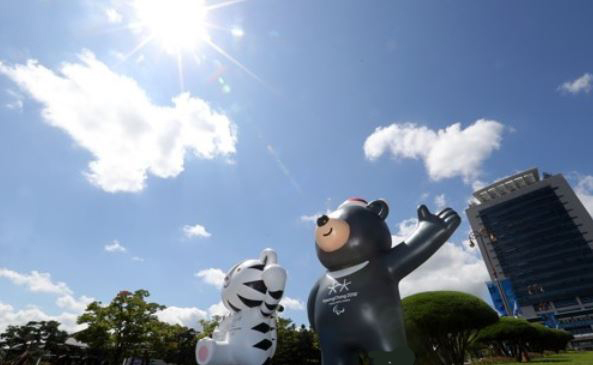Korea trains over 2,300 medical staff for PyeongChang Olympics
By YonhapPublished : Sept. 10, 2017 - 11:06
South Korea has been training more than 2,300 doctors, nurses, physical therapists and other medical staff on foreign languages, sports psychology counseling and even skiing as they get ready to provide expert care at next year's PyeongChang Winter Olympics, organizers said Sunday.
PyeongChang, the northeastern mountainous resort town in Gangwon Province, will host the Winter Olympiad from Feb. 9-25 with more than 6,500 athletes and officials from 95 countries set to attend.
PyeongChang 2018 will be the first Olympics in South Korea since the 1988 Seoul Summer Olympic Games.
A dozen venues in PyeongChang and its sub-host cities of Gangneung and Jeongseon will stage seven sports across 15 disciplines.
"We will begin a simulation training next month so we can better serve Olympians in an emergency," said Lee Young-hee, general director of the Wonju Severance Christian Hospital.
PyeongChang, the northeastern mountainous resort town in Gangwon Province, will host the Winter Olympiad from Feb. 9-25 with more than 6,500 athletes and officials from 95 countries set to attend.
PyeongChang 2018 will be the first Olympics in South Korea since the 1988 Seoul Summer Olympic Games.
A dozen venues in PyeongChang and its sub-host cities of Gangneung and Jeongseon will stage seven sports across 15 disciplines.
"We will begin a simulation training next month so we can better serve Olympians in an emergency," said Lee Young-hee, general director of the Wonju Severance Christian Hospital.

Officials of the PyeongChang Organizing Committee for the 2018 Olympic & Paralympic Winter Games said doctors and other medical staff have been undertaking training in skiing and foreign languages for the past couple of years.
The medical staff will even provide psychology counseling in consideration of the psychological pressure players can experience as they try their best after preparing for the event for the past four years, the officials said.
"We've trained and educated the medical staff on a variety of fields, and I think they will serve a valuable asset for the Olympics to be held after PyeongChang," Lee said, noting the PyeongChang organizers had respectfully turned down requests by international organizations to invite foreign medical experts on such winter sports as bob sleigh and other winter sports that South Korean medical staff have little firsthand experience in.
Lee said his team has been analyzing statistics on injuries that took place at the 2010 Vancouver and 2014 Sochi Winter Olympics, noting the data revealed snow board, free style and alpine skiing, and ice hockey involved the most frequent incidents.
"Medical staff with expertise on the sports with high injury rates will be stationed at the medical centers in the field and at stadiums during events," he said. "We've also prepared state-of-the-art ambulances and emergency helicopters."
An official of Gangneung Asan Hospital in the eastern port city of Gangneung, Gangwon Province, said the hospital has secured a number of interpreters and a separate hospital ward for the players at the PyeongChang Olympics.
"We will provide the best medical service for the PyeongChang Olympics based on the experience accumulated during the Sochi and Rio de Janeiro Olympics," Lee of the Wonju Severance Christian Hospital said. (Yonhap)







![[KH Explains] Hyundai's full hybrid edge to pay off amid slow transition to pure EVs](http://res.heraldm.com/phpwas/restmb_idxmake.php?idx=644&simg=/content/image/2024/04/18/20240418050645_0.jpg&u=20240419100350)







![[From the Scene] Monks, Buddhists hail return of remains of Buddhas](http://res.heraldm.com/phpwas/restmb_idxmake.php?idx=652&simg=/content/image/2024/04/19/20240419050617_0.jpg&u=20240419175937)

![[KH Explains] Hyundai's full hybrid edge to pay off amid slow transition to pure EVs](http://res.heraldm.com/phpwas/restmb_idxmake.php?idx=652&simg=/content/image/2024/04/18/20240418050645_0.jpg&u=20240419100350)

![[Today’s K-pop] Illit drops debut single remix](http://res.heraldm.com/phpwas/restmb_idxmake.php?idx=642&simg=/content/image/2024/04/19/20240419050612_0.jpg&u=)